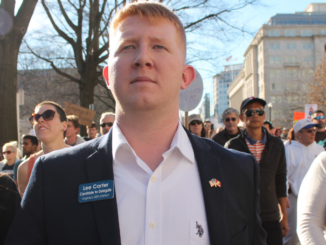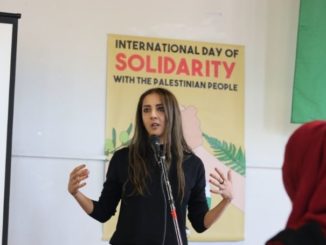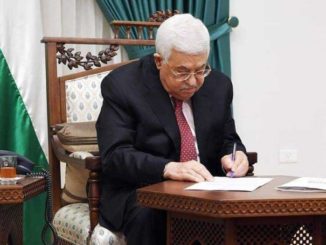
By Blake Alcott
At a recent Palestine conference in Istanbul, many speakers talked of ‘the Palestinian cause’. Many also spoke of ‘solidarity’ with the Palestinians. What do these words mean?
Although I’ve been active in solidarity with the Palestinian cause for ten years, I had to admit to myself that if asked by a ‘man on the street’ in the West, I could only give a vague or even contradictory answer to the questions of what the cause is, and with what one is being asked to be in solidarity with. We all have a general idea and can point to specific rights violations, or know that Zionism itself is the problem, but a short, precise answer?
In the fight against Apartheid South Africa, internationals like myself could say the cause is ‘one man, one vote’ – a standard human rights-based democracy modeled on constitutions from all over the world. One could point to the Freedom Charter and to the broad anti-Apartheid consensus, after the offer of Bantustans was rejected, as to what internationals are in solidarity with.
In the Civil Rights struggle in the U.S., similarly, there was a clear and unanimous call for equality as citizens. And I suppose that, after most feminists had rejected various offers of partial enfranchisement, men the world over knew exactly what the cause was when they supported Women’s Suffrage.
Palestine is, of course, more complicated, both because it has been divided in addition to being conquered and because the PLO in the late 1980s and early 1990s abandoned the simple goal of national liberation. Consequently, some Palestinians support the two-state solution, some a re-unified democratic state and others a re-unified Islamic state. There is no clarity or straightforward vision.
But can a liberation movement do without a vision that is 1) inspiring and 2) simple to convey?
Which Cause, Solidarity with Which Palestinians?
For some, the cause is a sovereign state, any state, even on 15% of Palestine. This comes however at the price of leaving the diaspora in the diaspora and leaving the Palestinians in Israel to fend for themselves. The cause is: some of the rights of some of the Palestinians.
For others, the cause is getting all of the homeland back, with Right of Return as the non-negotiable key, and replacing present-day Israel and the territories occupied in 1967 with a democracy. This corresponds to fulfilling all the rights of all the Palestinians.
Perhaps this disunity on the basics is unavoidable today. But from 1918 until 1988 there actually was Palestinian unity: freedom from Britain, Zionism, and Israel, no dispossession from the land. Such a goal today would make the Palestinian cause easier to understand for the rest of the world.
It is inevitable and understandable that some Palestinians have fought long and hard enough from inside and outside of prison, have lost enough relatives and friends and will settle for the two-state compromise. This stance is to be respected, even if it is in the form of a final settlement.
It is also logical that some Palestinians balk at the sheer unfairness of the two-state solution, and have also perhaps concluded that the two-state cause has now been tried but has failed. Thus, for ethical as well as practical reasons the cause should be the single independent democratic state insisted on by all Palestine Arab Congresses and then by the PLO for 70 years. Many feel there is nothing more to lose, so why not ‘go for it’.
In any case, if we internationals want to work and argue for a Palestinian cause we must pick and choose. Which cause? Solidarity with which Palestinians? Otherwise, we are left with the dampening message that there is as yet no Palestinian consensus, and we have to revert to focusing not on a goal but on Israel’s specific misdeeds as a settler-colonial, apartheid state.
For us, this is not inspiring and even causes feelings of helplessness. In my case, discussing with the public at Palestinian events and market-place stalls, I can say that it usually led to indeterminate, anti-climactic, qualified generalities then a parting shrug of the shoulders. There was no motivating and simple vision to point to.
BDS and Right of Return
Boycott, Divestment and Sanctions (BDS) offers the closest thing to a vision with its call for non-violent pressure on Israel until three demands are met: return, equality within the 1948-occupied territories, and sovereignty in the 1967-occupied territories. It also calls for ‘self-determination’, but this term is vague in leaving open the question of self-determination where. In most of the West Bank and Gaza Strip, or in all of Palestine?
We BDS supporters can point to these 3 concrete goals as, added together, ‘the Palestinian cause’ and can claim that it is explicitly supported by many, many Palestinians.
Similarly, we can follow the brave example of the Marches of Return from Gaza, and demand one single thing: that refugees become returnees – to their homes, places of origin, and property – wherever that is all over historic Palestine. This is a clearly conveyable cause with impeccable credentials in both ethics and international law. And it involves about 7 million Palestinians.
But are any relatively simple political solutions, or end ‘causes’, implied by BDS and Right of Return?
Rights vs Solutions
Many Palestinians have recently begun arguing that one should desist from debating political solutions, of debating for or against one state or two states. One often hears the message, ‘One state, two states, five states, no state, I just want my rights.’
The choice, however, I believe, comes down to just two – one democratic state or the permanent partition – even if a bi-national federation is somewhat different from one democratic state and even if some Palestinians contemplate the ‘Jordanian option’ of adding the West Bank once again to Jordan. (Nobody seems to be advocating two states on the borders of General Assembly Resolution 181 in 1947, which would make the discussion more interesting.)
Instead, these people argue, one should just argue for Palestinian rights, to whatever solution that leads. Or one should just keep fighting the (negative) fights against Israeli colonialism and ongoing ethnic cleansing and house destruction and apartheid.
In my experience, most of the Palestinians who argue against discussing solutions favor the two-state solution, but even some who focus on BDS, right of return and even one democratic state believe that the time is not ripe for settling the one-state/two-states question. I do not understand why working for rights and working for one solution or the other should be mutually exclusive, but many feel that more work must first be done against the many-headed Israeli state.
But are rights and solutions really separable? I don’t think so. Take for example BDS. The boycott would be called off when the 3 goals are fulfilled, and if they were fulfilled, what would be the result in terms of a political solution?
First, full equality would reign in the 1948-occupied territories. Second, the West Bank and Gaza Strip would be utterly sovereign. Third, if only 4 million of the roughly 7 million exiled Palestinians return, in what is now Israel there would no longer be a Jewish or a Zionist majority – something that results, as well, if only right of return is realized, without equality and without an end to the 1967 occupation.
The result of the achievement of BDS’s goals would literally be Two Democratic States. But would there be any reason not to re-unify Palestine the following morning? If this logic holds up, then BDS actually implies one democratic state.
Put the other way around, it is easy to see that the two-state solution is not compatible with either right of return or equality within Israel, for one of the two states in the two-state solution is apartheid Israel, which could not let the refugees come back or treat its Palestinian citizens equally and still be called Israel.
What to Argue for?
Those of us in international solidarity as well as people in our societies who are thinking about the issue at all, and whom we are trying to convince, naturally ponder solutions. One cannot quit thinking, or play dumb. How can one help but work out the logic of which rights fit with which solutions? Yet it is sometimes said simply to ‘leave solutions to the Palestinians’. Of course, but can we not argue for one or the other, in order to make the options clear?
Some internationals do not enter the solutions debate because we shouldn’t ‘tell the Palestinians what to do’. I find this a strange stance, because none of us are in a position to tell a single Palestinian what to do. We have no power and no Palestinian has to listen to a single word we say. We are not Bernie Sanders, Jeremy Corbyn or Cyril Ramaphosa, all of whom might be in a position to co-dictate some solution (and all of whom support the two-state solution, by the way).
After a century of Zionism’s being imposed by outsiders – and debating the Question of Palestine without any Palestinians in the room – many Palestinians understandably object to any international acting as if they were an actual stakeholder. But does this mean not arguing for a political vision?
The dilemma of the international picking amongst Palestinian causes and choosing which Palestinians to support might be to simply admit it, and say that we have picked and chosen and that we support those Palestinians who support one or the other solution. Many Palestinians have written in detail for one democratic state, and I, for instance, support them, not the Palestinian Authority.
What we should not do is claim that supporting one or the other solution is supporting ‘the Palestinians’. We can’t claim this simply because there is no unity. In fact, while Palestinians in the West Bank and Gaza Strip are often polled as to their views on the best political solution, and the Palestinians in Israel as well, all Palestinians are never polled. Those in the diaspora are not even registered in a database. They are never asked, so we can only speculate on what a majority of Palestinians want.
It could be that hesitancy in coming out for one of the solutions can be explained by certain awkward consequences. Those for two states must answer the charge that they are supporting a Zionist solution, since Israel – yes, the Israel we know – would still exist, exist more safely and permanently than ever. The truncated Palestinian state, that is, has a price, and that price is both states ‘secure within their borders’.
Those, on the other hand, who support one democratic state must deal with the consequence that there would be no more Israel, no more Jewish state in Palestine. This entails navigating the minefield that has been laid around the concept of ‘destroying’ the ‘only Jewish state in the world’, of de-legitimizing Israel and denying its ‘right to exist’.
This is a huge challenge, but there are ways to defuse it: In most one-state visions the Jewish Israelis could stay as citizens. Violence is not contemplated. Most importantly during the witch-hunt over ‘anti-Semitism’, one can openly grant that Yes, a Jewish state somewhere might be justified, but not in Palestine – because it is against the will of the indigenous people and because it is at the cost of the Palestinians who had nothing to do with the European ‘Jewish problem’ in the first place. But whether Jewish, Christian or Hindu, it is any ethnocracy imposed from outside which is the problem.
A Vision
I can say from experience which internationals and which Jewish Israeli Jews are actively behind the two-state solution. They are the ones who want to save Israel’s skin. They argue pragmatically, that Zionism must give up ‘Judea and Samaria’ in order to salvage the state on some four-fifths of Palestine. Israel should stay, for historical reasons having mainly to do with European guilt. It should become nicer, but it is ‘right’ that it exists in Palestine. (Those in ‘solidarity’ supporting two states cannot, however, call themselves ‘anti-Zionist’.)
I also know from experience that next to no internationals are actually enthused about a two-state solution. They get enthused about BDS and ODS because their goals are clear and they don’t compromise even before the other side has come to the table.
The one-democratic-state vision, on the other hand, has the power to enthuse, because it contains all the rights of all the Palestinians and because it is simple and explicable. It is like other democracies on all continents. One can obviously put more energy and conviction into ‘justice for all’ than in ‘justice for some, tough luck for the rest’.
Palestinians and Internationals
I am assured by almost all Palestinians that the national liberation struggle needs outside support. Who can doubt that it would help if more and more academics, journalists, and governments would come to feel the need to pressure their governments to pressure Israel so that Palestinian rights can be fulfilled – or at least abandon their unwavering Zionism?
Internationals cannot be expected to suspend their own judgment as to what justice would entail, or to use their logic to see how the pieces of Palestinian rights fit into what solutions. We are in fact not able to simply follow and support the wishes of ‘the Palestinians’ because there is as of now no unity. I’ve seen a move towards one democratic state amongst the rank-and-file in the Palestine Solidarity Campaign in the U.K., for instance, even if that organization still holds back. It is something we can get behind with real feeling.
I also know many Palestinians who miss having a clear vision, shared at least by a large minority of Palestinians. A vision not only clear but inspiring. The idea of simple re-unification, democracy and right of return seems to fit this bill. I believe it would do the ‘cause’ good if advocating for this solution were accepted and its vision of combining anti-colonialism, equal rights and right of return were to crystallize into a Call like that of BDS in 2005, led by Palestinians.
– Blake Alcott is an ecological economist and the director of One Democratic State in Palestine (England) Limited. The author welcomes any information on ODS or bi-nationalism activity sent to blakeley@bluewin.ch. He contributed this article to The Palestine Chronicle.

– Blake Alcott is a retired cabinetmaker and ecological economist who has been a solidarity activist since 2010, now living in Zürich. He is Director of ODS in Palestine (UK), an NGO working to make One Democratic State more understandable to the public. His 2023 book, The Rape of Palestine: A Mandate Chronology, consists of 490 instances of the dialogue, such as it was, between the British and the Palestinians during the years 1917-1948. He contributed this article to The Palestine Chronicle









This is too intellectual, too sterile for me. My mantra since 1967 has been “END THE ILLEGAL OCCUPATION!” What is wrong with that “solution” to put paid to 22 percent of the theft of historical Palestine…the other 78 percent to be sorted out in due course and on equality of the rules of engagement?
Irritatingly to me, the author avoids the warfare-wordfare-lawfare (I could add welfare, as the Zionists suck my tit and “milk” the material wealth out of me and all goys) practiced by the Adelsons, Sabans, Satanyahus, Perles, Kushners, Greenblatts, Friedmans et al. As someone said “While we sit, look at, and discuss the disposition of the pizza, the Zionist throng is avidly devouring it.”
My reply: I don’t not understand the 2nd para.
As for the 1st para, 2 things are wrong with demanding liberation only in the West Bank/Gaza Strip. 1) That would come at the price of accepting Israel AS A JEWISH STATE and of giving up Right of Return. It also comes down to permanently giving up the goal of Palestinian self-determination. The other 78% cannot be “sorted out in due course”; removing it from the table was the price of the Bantustine.
2) All of Palestine is occupied, not just the 22%, so why is the one OK, the other not? Two-staters would have to admit to paying the price, which is obviously exorbitant. And it’s not a question of international law but of ethics.